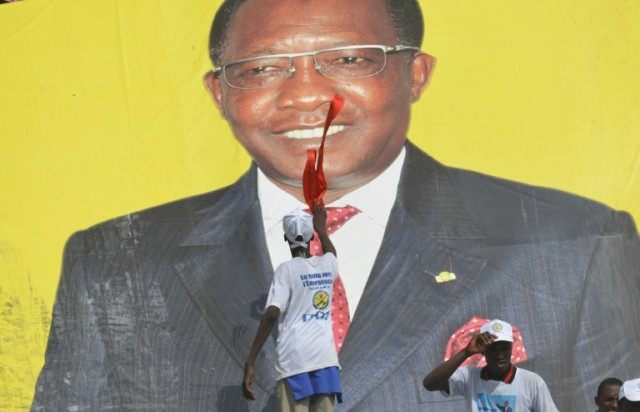N’Djamena (AFP) – Six million Chadians began voting Sunday in an election likely to see President Idriss Deby extend his 26-year rule in a country increasingly on the frontline of the global war on terror.
Deby, the warrior president who took office in a 1990 military coup, faces 12 challengers but is widely expected to win a fifth term after consolidating his grip on power in this central African nation.
Polling stations opened shortly after 7:00 am (0600 GMT) and were to close at 6:00 pm (1700 GMT). Early votes were cast on Saturday by soldiers, nomads and refugees.
Official provisional results may not be released for two weeks.
At a polling station in the capital N’Djamena, men and women waited patiently in separate queues to cast their ballots, many with their biometric voting card in hand, an AFP correspondent said.
Security forces were out en masse for the election, which is taking place in a country which has been hit by a series of suicide attacks.
The voters, who work from dawn just to gain enough to survive, look set to hand another mandate to Deby, whose resources far exceed those of his challengers in a nation classified by the UN as one of the five poorest countries in the world.
Under his leadership, the once unstable country has become both an oil producer and key player on the global anti-jihadist frontline, winning new strategic influence.
Yet, despite a wealth of new oil resources since 2003, half of the population of 13 million lives below the poverty line and seven out of 10 people cannot read or write.
The 63-year-old is facing unprecedented dissent at home.
Anger at the government has run high in recent months, prompting the authorities to crack down on protests and throw activist leaders in jail.
Just three days before the election, police fired live rounds and tear gas to disperse several hundred protesters angered by plans to hand six-month jail terms to five anti-government activist leaders.
– Over 100 dialects –
Chad is also facing an unprecedented security threat. It was hit by two jihadist attacks in the capital last year, while facing a constant threat of suicide attacks and raids.
To address the threats, Deby has tightened security while maintaining a strong presence in a regional force fighting the Nigeria-based Boko Haram Islamist group.
The country has scores of ethnic groups that speak more than 100 languages, and some of its conflicts have been blamed on divisions between Muslims, who make up 53 percent of the population, and Christians and animists.
Those tensions have also been fuelled by Deby handing top jobs to members of his Zaghawa ethnic group, whose members also largely head Chad’s feared army.
Ethnic resentment may be behind protests that erupted in February over the gang rape of a young woman by the sons of several leading army commanders and officials, including that of the foreign minister.
Two youngsters were killed when security forces cracked down on the demonstrations.
One of Deby’s challengers, Mahamat Yesko Brahim the father of the rape victim, stood down in favour of the president at the last minute. He was not immediately available to comment on the decision.
The most prominent of Deby’s challengers is Saleh Kebzabo, a Muslim from the southwest Mayo Kebbi province who first stood against him in 1996 and who heads the National Union for Development and Renewal (UNDR).
Another high-profile is former premier Joseph Djimrangar Dadnadji, a Christian from Mandoul in the south and one-time Deby ally.
“In the face of these accumulating challenges, Chadian authorities must avoid the politics of religious or geographic exclusion,” the International Crisis Group said in March.
“The greatest threat to stability in Chad in the long-term… (is) a national political crisis.”

COMMENTS
Please let us know if you're having issues with commenting.